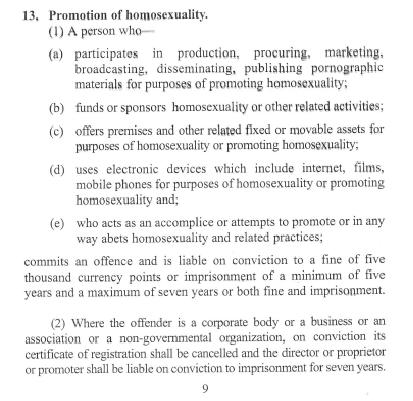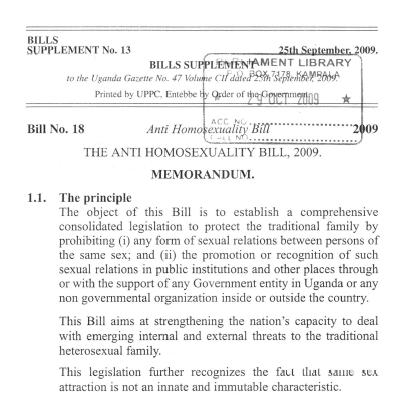I received this statement earlier today. Obviously, Uganda’s lawyers have great reservations about the Bahati bill.
UGANDA LAW SOCIETY VIEWS ON
THE ANTI HOMOSEXUALITY BILL
The Anti-Homosexuality Bill proposed to Parliament in 2009 would, if enacted into law, in its current state violate international human rights law and lead to further human rights violations.
The bill has been received with mixed feelings of both praise and strong criticism with praise coming from the local populace and criticism from the international media, western governments, international and local gay rights, human rights, civil rights, and scientific organizations, world leaders, some Christian organizations including the Roman Catholic Church, the Anglican Church of Canada.
The Uganda Law Society (ULS) is an institution that defends and promotes constitutionalism, the rule of law and the human rights of every Ugandan citizen. The ULS therefore in the same spirit acknowledges and defends 100% the rights of all citizens including the small percentage of the population living as homosexuals.
Predicted outcomes of this bill
If passed, the bill would institutionalize discrimination against those who are, or thought to be gay, lesbian, bisexual or transgender. It would also reinforce the existing legislation against consensual sex between individuals of the same sex which legislation is itself contrary to international human rights norms. The bill would further purport to criminalise the ‘promotion’ of homosexuality, compel HIV testing in certain circumstances, impose life sentences for entering into a same-sex marriage, introduce the death penalty for ‘aggravated’ homosexuality, as well as punish those who fail to report knowledge of any violations of its provisions within 24 hours.
Generally, the bill would violate the principle of non-discrimination and would lead to violations of the human rights to freedom of expression, freedom of thought, conscience and religion, freedom of peaceful assembly, freedom of association, liberty and security of the person, privacy, the highest standard of health, and to life. These rights are guaranteed under the Constitution of Uganda and in international and regional treaties to which Uganda is party, which include the International Covenant on Civil and Political Rights (ICCPR), the International Covenant on Economic, Social and Cultural Rights (ICESCR) and the African Charter on Human and Peoples’ Rights (African Charter). Specifically under our Constitution the relevant provisions promoting protection and non-criminalization of minority activities as long as they are not contrary to the law are provided under –
Article 20(1) on inherent fundamental rights and freedoms of the individual; Article 21 on equality before and under the law in all spheres of political, economic, social and cultural life and in every other respect as well as the enjoyment of equal protection of the law. Further, Article 24 requires that no person shall be subjected to any form of torture or cruel, inhuman or degrading treatment or punishment. Discrimination and punishment basing on one’s sexual orientation is cruel, inhuman or degrading treatment.
Article 29(1) (a), (b), (c), and (d) states every person shall have a right to freedom of speech and expression, freedom of thought, conscience and belief, freedom to manifest such practicewhich shall include the right to belong to and participate in the practices of any organization, freedom of association which shall include the freedom to form and join other civic organizations. The bill criminalizes all forms of publications and expression concerned or related to gay rights.
Article 36 requires the protection of rights of minorities in decision-making processes, and their views and interests shall be taken into account in the making of national plans and programs – the gay and lesbian community is a minority in Uganda. And Article 45 saves other additional human rights and freedoms not specifically mentioned in the preceding articles and these rights include gay rights.
All these provisions when interpreted are to the effect that individual rights and freedoms should be respected as long as those rights don’t affect the enjoyment of other people’s rights.
The ULS is not in any way promoting homosexuality in Uganda but calling for the observance and protection of the rights of homosexuals as human beings, a minority group and as citizens of Uganda. We reckon that the spirit of the bill is for noble and moral intentions such as to protect the traditional family, children, youth and cherished cultural values among others. It should however be alive to the fact that we live in a multi–lateral society comprised of various rights, interests and freedoms and should either be tolerated, restricted but not criminalized or banished.
FOR GOD AND MY COUNTRY
James Mukasa Sebugenyi
PRESIDENT – UGANDA LAW SOCIETY
Email: [email protected]

